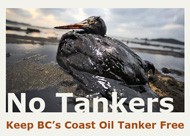Today, Vancouver Quadra Liberal MP and former B.C. Environment Minister Joyce Murray introduced legislation in Canada’s House of Commons that would formally ban oil tanker traffic in B.C.’s North Coast. Bill C-606 comes days after a successful House of Commons motion demonstrated support for a legislated ban on oil tankers.
Though the motion carried, the victory was only bittersweet because the motion passed is not binding, and merely calls on the Tory government to legislate a formal ban. The Conservative government maintains that a ban is unnecessary since a long-standing, informal moratorium on oil tanker traffic and all offshore oil and gas activity has been in effect since 1972. Yet last year, the Harper government quietly affirmed that it is not legally bound to maintain a moratorium on oil drilling off the coast of British Columbia. The government determined that the 1972 ban doesn’t technically apply to oil-tanker traffic. To date, eight Canadian prime ministers have upheld the moratorium, but that could all change. The B.C. government is currently lobbying the federal Conservative government to revoke the ban. Opposition parties fear the Tory government will allow the ban to be lifted in order to profit from growing Asian energy markets.
Public opinion is favourable to a tanker ban. A 2010 Mustel poll for Forest Ethics demonstrated that 80 percent of British Columbians support a ban on crude oil tankers in B.C.’s coastal waters. Support for a ban has grown from 72 percent in 2008. The Mustel poll found that 51 percent of Canadians oppose Enbridge’s Northern Gateway pipeline, and those who strongly oppose the ban far outnumber proponents.
Bill C-606 would entrench Prime Minister Pierre Elliot’s 1972 moratorium on tankers. It amends Part 9 of the Canada Shipping Act, 2001 to prohibit the transportation of oil by oil tankers in the areas of the sea adjacent to Canada’s Pacific North Coast known as Queen Charlotte Sound, Hecate Strait and Dixon Entrance. It also allows the Governor in Council, on the recommendation of the Minister of Fisheries and Oceans, to designate other areas of the sea in which the transportation of oil by oil tankers is prohibited.
The bill will be debated and voted on in Canada’s House of Commons in 2011.
Any formal legislation would put a lid on Enbridge’s plans to develop a $5.5 billion 1,170-kilometre pipeline to carry tar sands bitumen from Alberta’s tar sands to Kitimat, B.C., to be loaded onto supertankers destined for hungry energy markets in Asia.
There has already been widespread criticism for Enbridge’s Northern Gateway project including the 61 First Nations groups from the Fraser Watershed who issued a declaration banning oil pipelines and tankers. To date, no First Nations group has publicly declared support for the project.
According to Enbridge’s own Corporate Social Responsibility Report, they have a glowing record of environmental performance, safety and fairness, and public disclosure. This record is somewhat fulsome if you consider their spill record. According to the Polaris Institute, Enbridge caused 713 spills between 1999 and 2009. These spills released approximately 21.3 million litres (133,856 barrels) of hydrocarbons into the environment.
Perhaps as a consequence of their spill record, Enbridge has been hard at work in B.C. to build ‘grassroots’ support for their pipeline project. According to information secured by the Prince George Citizen, Enbridge has been footing the bill for a Astroturf front group to build support for their pipeline project. The Northern Gateway Alliance is the work of Enbridge who fears opposition to their profitable pipeline. Former Prince George mayor Colin Kinsley is the chair of the ‘Astroturf Alliance’ and on Enbridge’s payroll, eager to convince Canadians that the pipeline project is safe and will create jobs and opportunities in Alberta and B.C.’s north.
Will the House of Commons legislate a formal ban on oil tanker traffic in B.C.’s North Coast? Review the legislation introduced today here [PDF].
Image Credits: Dogwood Initiative
Subscribe to our newsletter
Stay up to date with DeSmog news and alerts






